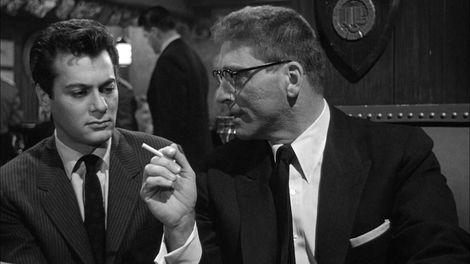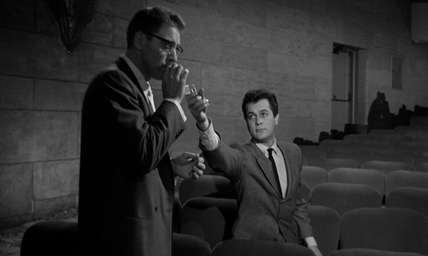Last time, we witnessed the power of the newspaper writer through screwball comedy. Today, it’s only a slight adjustment to noir.
In His Girl Friday, the scamps of the newsroom wield their power against the dishonest politicians and crooked police. They weren’t any less corrupt than their targets, but by opposing a corrupt status quo, they struck a kind of balance for the readership. But in Sweet Smell of Success the power of the newspaper writer serves itself first, leading a tail of beggars hoping for scraps.
Released in America on the 4th of July in 1957, Sweet Smell of Success opens on the woes of press agent Sidney Falco (Tony Curtis) who is in the doghouse with his clients because he’s in the doghouse with gossip columnist J.J. Hunsecker (Burt Lancaster). Hunsecker refuses to print any of Falco’s items until Falco can break up his sister Susan (Susan Harrison) from her jazz musician boyfriend Steve Dallas (Martin Milner). Fifty years before facebook, Falco is basically worthless to his angry clients without his line to Hunsecker.
In this movie, the only thing rottener than an arrogant columnist is a desperate press agent, and things get nasty in a hurry. Falco’s plan involves attempted blackmail and using sex (and not with him) to get a “blind” smear printed about Dallas in a rival paper so Susan won’t connect it back to Hunsecker (Steve faces duel accusations of being a Communist and a reefer addict!) Susan, not being an idiot, sees the connection right away and the plot grows deeper along with Falco’s greed and Hunsecker’s petty ire.
The list of misdeeds for the leads and their cronies in Friday and Success is strikingly similar. Walter might even have the stronger resume, coming perilously close to wrongful death charges. But the tones are 180 degrees apart. Wrongful imprisonment is never not funny in Friday. Here it breaks a man. Both films feature witty dialog and quick zingers – Hunsecker famously tells Falco “I’d hate to take a bite outta you. You’re a cookie full of arsenic.” While there’s a few laughs in Success, the vibe is a serious one of elevated stakes.*

Though Hunsecker doesn’t even appear until nearly a third of the way through the movie though his shadow already covers everything prior. His introductory scene is tour-de-force by Lancaster, who cows a senator with insinuations and makes his keen skills of observation as clear as his unwillingness to suffer fools. “Why does everything you say sound like a threat?” asks the senator. Hunsecker turns it around: “Maybe it’s a mannerism – because I don’t threaten friends.” On paper the line could be read with a sly smile, but Lancaster delivers it like a gun to the ribs. He’s clever but he has no interest in being liked, just feared and respected.
The character and performance are based on New York gossip columnist Walter Winchell who went to lengths to sabotage his daughter’s relationship in a similar way as Hunsecker breaking up Susan and Steve. Changing the detail of the daughter to the sister, aside from giving a few scenes a whiff of incest, pushes the film’s romantic pairing out of the spotlight. There are women around – Falco coerces a cigarette girl to prostitute herself to a rival columnist/sleazebag in a superior and very uncomfortable scene – but Falco and Hunsecker remain immune romance or really any other connections that aren’t within their tunneled visions. There isn’t a relationship that one of them forms that isn’t exploited in the climb up the “golden ladder.”
Hunsecker’s column is the source of all power in the movie. A mere mention in the column can make or break professional and personal lives. It’s the Excalibur that grants Hunsecker his kingdom. When Dallas slights him, he hasn’t just offended the man but his readership. “Don’t you see that today that boy wiped his feet on the choice, on the predilections of sixty million men and women in the greatest country of the world?” Hunsecker says. When Falco refuses to go along further with Hunsecker’s schemes, Hunsecker draws him back in by offering to let him write the column while he takes Susan away on a three-month trip. The power is too great for Falco to resist.
It’s interesting to see the respect for the authority of newsprint in both His Girl Friday and Sweet Smell of Success even while the writers are held in contempt. Looking ahead, if Walter Burns and J.J. Hunsecker were the nation’s idea of newsmen, it’s no wonder that journalists received a flood of scorn once the protection of their readerships eroded in the age of the Internet. The kind of focused demagoguery of the gossip column and op-ed pages would translate to other mediums (witness Howard Beale’s following in Network or, for real life examples, the phenomena of Rush Limbaugh and Glenn Beck). But in the Internet age, the potency of this sort of influence seems to have dissolved and spread thinner like everything else.**
Like the other aspects of print journalism, Hunseckerism is diluted, but the venom contaminates twitter accounts, blogs and entire news sites across the board. There may not be giants the size of J.J. to deal with but there’s no fewer Falcos running around.
* This seems especially unusual as director Alexander Mackendrick was previously known for his Ealing comedies like The Man in the White Suit and The Ladykillers. A theory: he was skilled enough with comedy to know the funny lines would land on their own and could focus his efforts on the drama. For a really great write-up on the filmmaking, see this piece by Babalugats.
** I know, I know. I contend it is this dilution that allowed a slightly more cohesive minority to influence the current state of the country.


